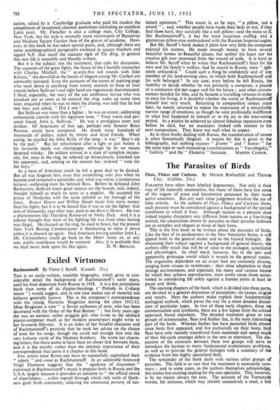Exiled Virtuoso
Rachmaninoff. By Victor I. Seroff. (Cassell. 21s.) Tins is an easily-written, readable biography, which gives in con- siderable detail the background of Rachmaninoff's early years, until his final departure from Russia in 1918. It is a less journalistic book than some of its chapter-headings (" Prelude in C-sharp minor ") would suggest, and in one case makes use of material not hitherto generally known. This is the composer's correspondence with the young Marietta Shaginian during the years 1912-13. Mme Shaginian is now" a Soviet authoress of note, who has been decorated with the Order of the Red Banner " ; but forty years ago she was an earnest, rather priggish girl, who wrote to the idolised Pianist-composer much as her modern counterpart might write to her favourite film-star. It is an index of her forceful character and of Rachmaninoff's passivity that he took her advice on the choice of texts for his songs, though she could not inveigle him into the very kulturny circle of the Medtner brothers. He wrote her charm- ing letters, but there seems to have been no closer link between them, and it is the novelty rather than the intrinsic importance of their correspondence that earns it a chapter in this book. Few artists since Byron can have so successfully capitalised their " spleen" and ennui as Rachmaninoff. In an admirable foreword Virgil Thomson suggests that the "opulence of discontent" expressed in Rachmaninoff's music is popular both in Russia and the U.S.A. largely because it provides an antidote to" the official mood of cheerfulness. . . a thin topsoil through which rich wells of black- ness gush forth constantly, relieving the emotional poverty of sus- tained optimism." This music is, as he says, "a pillow, not a sword " ; and, whether people have made their beds or not, if they find them hard, they naturally like a soft pillow—and the more so if like Rachmaninoff's, it has the most luxurious stuffing and a glamorous pillow-case embroidered with the Russian Imperial eagles.
But Mr. Seroff's book makes it plain how very little the composer enjoyed his success. -He made enough money to have several beautiful homes in.kkautiful places, but neither his heart nor his creative gift ever recovered from the wound of exile. It is hard to believe Mr. Seroff when he writes that Rachmaninoff's fears for his own and his family's welfare, had he stayed in Russia, were" defi- nitely unfounded." Could such a thing be 'confidently said of any member of the land-owning class, to which both Rachmaninoff and his wife belonged ? In any case, even before he left Russia, his inability to decide whether he was primarily a composer, a pianist or a conductor did itot augur well for his future ; and when circum- stances decided for him, and he becaine a travelling virtuoso in order to earn his living, it is doubtful whether the world or Rachmaninoff himself lost very much. Returning to composition sixteen years later, he merely returned to repeat the expression of a remarkably narrow range of emotions, as though he were profoundly indifferent to what had happened -to himself or to his art in the intervening period. As a pianist he achievecPan almost fabulous reputation even before he died, but no musicians looked with. interest to his next composition. They knew too well what to expect. • As in most books dealing with Russia, the transliteration of names is often fantastically illogical. A reason for this is given in the bibliography, but nothing excuses " Zverev " and " Sverev " for the same man or such misleading transliterations as" Vsevologsky," " Golizin "and the" Ekaterin " Institute. MARTIN COOPER.


































 Previous page
Previous page